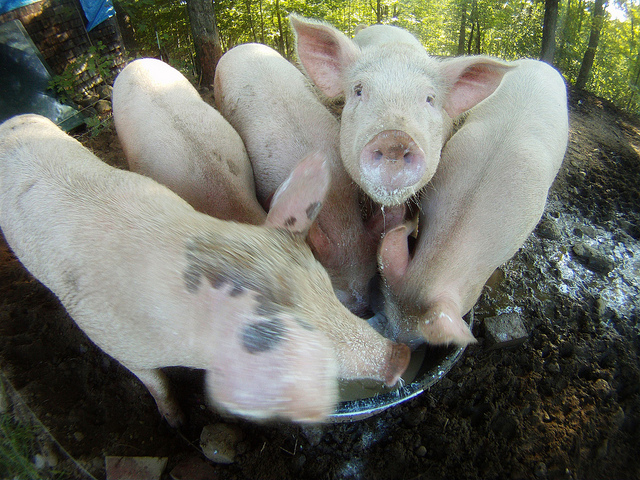Archive for the ‘Positivity’ Category
Bad Behavior or Unskillful Behavior?
 What if you could see everyone as doing their best?
What if you could see everyone as doing their best?
When they are ineffective, what if you think they are using all the skills to the best of their abilities?
What changes when you see people as having a surplus of good intentions and a shortfall of skills?
If someone cannot recognize social cues and behaves accordingly, what does that say about them?
What does it say about you if you judge them as if they recognize those social cues?
Even if their best isn’t all skillful, what if you saw them as doing their best?
When someone treats you unskillfully, maybe they never learned how to behave skillfully.
When someone yells at you, maybe yelling is the only skill they were taught.
When someone treats you unskillfully, maybe that’s the only skill they have at their disposal.
And what if you saw them as doing their best?
Unskillful behavior cannot be stopped with punishment.
Unskillful behavior changes only when new skills are learned.
New skills are learned only when they are taught.
New skills are taught only when a teacher notices a yet-to-be-developed skillset.
And a teacher only notices a yet-to-be-developed skillset when they understand that the unskillful behavior is not about them.
And when a teacher knows the unskillful behavior is not about them, the teacher can teach.
And when teachers teach, new skills develop.
And as new skills develop, behavior becomes skillful.
It’s difficult to acknowledge unskillful behavior when it’s seen as mean, selfish, uncaring, and hurtful.
It’s easier to acknowledge unskillful behavior when it’s seen as a lack of skills set on a foundation of good intentions.
When you see unskillful behavior, what if you see that behavior as someone doing their best?
Unskillful behavior cannot change unless it is called by its name.
And once called by name, skillful behavior must be clearly described within the context that makes it skillful.
If you think someone “should” know their behavior is unskillful, you won’t teach them.
And when you don’t teach them, that’s about you.
If no one teaches you to hit a baseball, you never learn the skill of hitting a baseball.
When their bat always misses the ball, would you think the lesser of them? If you did, what does that say about you?
What if no one taught you how to crochet and you were asked to knit scarf? Even if you tried your best, you couldn’t do it. How could you possibly knit a scarf without developing the skill? How would you want people to see you? Wouldn’t you like to be seen as someone with good intentions that wants to be taught how to crochet?
If you were never taught how to speak French, should I see your inability to speak French as a character defect or as a lack of skill?
We are not born with skills. We learn them.
And we cannot learn skillful behavior unless we’re taught.
When we think they “should” know better, we assume they had good teachers.
When we think their unskillful behavior is about us, that’s about us.
When we punish unskillful behavior, it would be more skillful to teach new skills.
When we use prizes and rewards to change behavior, it would be more skillful to teach new skills.
When in doubt, it’s skillful to think the better of people.
Image credit — Steve Baker
Whatever your situation, be thankful for it.
 If you’re thankful for the success you’ve had, you’re in for a letdown because your success will be short-lived. And don’t take it personally – the Universe knows regression to the mean is real and it will bring you to your knees whether you believe it or not. Like with all things, success is impermanent.
If you’re thankful for the success you’ve had, you’re in for a letdown because your success will be short-lived. And don’t take it personally – the Universe knows regression to the mean is real and it will bring you to your knees whether you believe it or not. Like with all things, success is impermanent.
Your success has a half-life. Sure, your success has been good. You’ve made money; your brand has prospered, and everyone is happy. But, don’t get too comfortable because it’s going away. Your recipe will run out of gas as your competition targets your success and figures out how to do it better. But don’t blame your competitors’ hard work. Blame yourself and your success. It’s pretty clear your success has blocked you from doing things differently. The real problem isn’t your competitors’ success; the real problem is your success. Your success has blocked you from trying something new. As the thinking goes – if it ain’t broke, don’t fix it. But, if it ain’t broke now, it will be broken soon.
If you’re sad (unthankful) because of the failure you’ve experienced, you’re in for a burst of goodness because your failure will be short-lived. And don’t feel special – the Universe knows regression to the mean is real and it will bring you success if you believe you’re worthy of it. Like with all things, failure is impermanent.
Your failure has a half-life. Sure, your failure has been bad. You’ve not made money; your brand has suffered; and everyone is unhappy. But, don’t hold onto your discomfort because it’s going away. Because your recipe hasn’t worked, you’ll target your competitors’ success and try a new recipe. It’s pretty clear your lack of success caused you to try a new recipe. And because you tried something new, you figured out how to do it better. But Don’t give credit to your competitors. Give credit to yourselves for trying something new. The real root cause isn’t your competitors’ success; the real forcing function is your lack of success. Your lack of success has opened up your thinking and enabled you to try something new. As the thinking goes – if it didn’t work last time, do something different. And that’s just what you did.
Don’t be thankful for your success; be thankful you have smart people who want to make a difference. And don’t be unthankful for your failure; be thankful you have smart people who want to make a difference.
As a leader in a successful company, what will you do to support people who want to make a difference? As a leader, you must protect their new ideas from the army of people that want to regurgitate what was done last time. Because of your success, their new ideas will be taken out at the knees. And what will you do? Will you roll over and kowtow to un-thinkers? Or, will you take the bullets and advocate for ideas that violate your long-in-the-tooth, geriatric recipe that can no longer deliver what it used to?
And as a leader in a yet-to-be successful company, what will you do to support people who want to make a difference? As a leader, you must protect their new ideas from the army of people that have no idea what to do next. Because of your failure, their new ideas will be met with negativity and derision. And what will you do? Will you give in to the naysayers? Or, will you take the bullets and advocate for ideas that transcend your unsuccessful recipe?
Be thankful for your success, but don’t let it limit you from trying something new. And be thankful for your failure, and use it to power your new ideas.
Whatever your situation, don’t dismiss it. Whatever your situation, learn from it. And whatever your situation, be thankful for it.
Image credit — Irudayam
The Trust Network II
 I stand by my statement that trust is the most important element in business (see The Trust Network.)
I stand by my statement that trust is the most important element in business (see The Trust Network.)
The Trust Network are the group of people who get the work done. They don’t do the work to get promoted, they just do the work because they like doing the work. They don’t take others’ credit (they’re not striving,) they just do the work. And they help each other do the work because, well, it’s the right thing to do.
Sometimes, they use their judgement to protect the company from bad ideas. But to be clear, they don’t protect the Status Quo. They use their good judgement to decide if a new idea has merit, and if it doesn’t, they try to shape it. And if they can’t shape it, they block it. Their judgement is good because their mutual trust allows them to talk openly and honestly and listen to each other. And through the process, they come to a decision and act on it.
But there’s another side to the Trust Network. They also bring new ideas to the company.
Trying new things is scary, but the Trust Network makes it safe. When someone has a good idea, the Network positively reinforces the goodness of the idea and recommends a small experiment. And when one installment of positivity doesn’t carry the day, the Trust Network comes together to create the additional positivity need to grow the idea into an experiment.
To make it safe, the Trust Network knows to keep the experiment small. If the small experiment doesn’t go as planned, they know there will be no negative consequences. And if the experiment’s results do attract attention, they dismiss the negativity of failure and talk about the positivity of learning. And if there is no money to run the experiment, they scare it up. They don’t stop until the experiment is completed.
But the real power of the Trust Network shows its hand after the successful experiment. The toughest part of innovation is the “now what” part, where successful experiments go to die. Since no one thought through what must happen to convert the successful experiment to a successful product, the follow-on actions are undefined and unbudgeted and the validated idea dies. But the Trust Network knows all this, so they help the experimenter define the “then what” activities before the experiment is run. That way, the resources are ready and waiting when the experiment is a success. The follow-on activities happen as planned.
The Trust Network always reminds each other that doing new things is difficult and that it’s okay that the outcome of the experiment is unknown. In fact, they go further and tell each other that the outcome of the experiment is unknowable. Regardless of the outcome of the experiment, the Trust Network is there for each other.
To start a Trust Network, find someone you trust and trust them. Support their new ideas, support their experiments and support the follow-on actions. If they’re afraid, tell them to be afraid and run the experiment. If they don’t have the resources to run the experiment, find the resources for them. And if they’re afraid they won’t get credit for all the success, tell them to trust you.
And to grow your Trust Network, find someone else you trust and trust them. And, repeat.
Image credit — Rolf Dietrich Brecher
Growth Isn’t The Answer
 Most companies have growth objectives – make more, sell more and generate more profits. Increase profit margin, sell into new markets and twist our products into new revenue. Good news for the stock price, good news for annual raises and plenty of money to buy the things that will help us grow next year. But it’s not good for the people that do the work.
Most companies have growth objectives – make more, sell more and generate more profits. Increase profit margin, sell into new markets and twist our products into new revenue. Good news for the stock price, good news for annual raises and plenty of money to buy the things that will help us grow next year. But it’s not good for the people that do the work.
To increase sales the same sales folks will have to drive more, call more and do more demos. Ten percent more work for three percent more compensation. Who really benefits here? The worker who delivers ten percent more or the company that pays them only three percent more? Pretty clear to me it’s all about the company and not about the people.
To increase the number of units made implies that there can be no increase in the number of people required to make them. To increase throughput without increasing headcount, the production floor will have less time for lunch, less time for improving their skills and less time to go to the bathroom. Sure, they can do Lean projects to eliminate waste, as long as they don’t miss their daily quota. And sure, they can help with Six Sigma projects to reduce variation, as long as they don’t miss TAKT time. Who benefits more – the people or the company?
Increased profit margin (or profit percentage) is the worst offender. There are only two ways to improve the metric – sell it for more or make it for less. And even better than that is to sell it for more AND make it for less. No one can escape this metric. The sales team must meet with more customers; the marketing team must work doubly hard to define and communicate the value proposition; the engineering staff must reduce the time to launch the product and make it perform better than their best work; and everyone else must do more with less or face the chopping block.
In truth, corporate growth is the fundamental behind global warming, reduced life expectancy in the US and the ridiculous increase in the cost of healthcare. Growth requires more products and more products require more material mined, pumped or clear-cut from the planet. Growth puts immense pressure on the people doing the work and increases their stress level. And when they can’t deliver, their deep sense of helplessness and inadequacy causes them to kill themselves. And healthcare costs increase because the companies within (and insuring) the system need to make more profit. Who benefits here? The people in our community? The people doing the work? The planet? Or the companies?
What if we decided that companies could not grow? What if instead companies paid dividends to the people do the work based on the profit the company makes? With constant output wouldn’t everyone benefit year-on-year?
What if we decided output couldn’t grow? What if instead, as productivity increased, companies required people to work fewer hours? What if everyone could make the same number of products in seven hours and went home an hour early, working seven and getting paid for eight? Would everyone be better off? Wouldn’t the planet be better off?
What if we decided the objective of companies was to employ more people and give them a sense of purpose and give meaning to their lives? What if we used the profit created by productivity improvements to employ more people? Wouldn’t our communities benefit when more people have good jobs? Wouldn’t people be happier because they can make a contribution to their community? Wouldn’t there be less stress and fewer suicides when parents have enough money to feed their kids and buy them clothes? Wouldn’t everyone benefit? Wouldn’t the planet benefit?
Year-on-year growth is a fallacy. Year-on-year growth stresses the planet and the people doing the work. Year-on-year growth is good for no one except the companies demanding year-on-year growth.
The planet’s resources are finite; people’s ability to do work is finite; and the stress level people can tolerate is finite. Why not recognize these realities?
And why not figure out how to structure companies in a way that benefits the owners of the company, the people doing the work, the community where the work is done and the planet?
Image credit – Ryan
Is your work meaningful?
 Life’s too short to work on things that don’t make a difference. Sure, you’ve got to earn a living, but what kind of living is it if all you’re doing is paying for food and a mortgage? How do others benefit from your work? How does the planet benefit from your work? How is the world a better place because of your work? How are you a better person because of your work?
Life’s too short to work on things that don’t make a difference. Sure, you’ve got to earn a living, but what kind of living is it if all you’re doing is paying for food and a mortgage? How do others benefit from your work? How does the planet benefit from your work? How is the world a better place because of your work? How are you a better person because of your work?
When you’re done with your career, what will you say about it? Did you work at a job because you were afraid to leave? Did you stay because of loss aversion? Did you block yourself from another opportunity because of a lack of confidence? Or, did you stay in the right place for the right reasons?
If there’s no discomfort, there’s no growth, even if you’re super good at what you do. Discomfort is the tell-tale sign the work is new. And without newness, you’re simply turning the crank. It may be a profitable crank, but it’s the same old crank, none the less. If you’ve turned the crank for the last five years, what excitement can come from turning it a sixth? Even if you’re earning a great living, is it really all that great?
Maybe work isn’t supposed to be a source of meaning. I accept that. But, a life without meaning – that’s not for me. If not from work, do you have a source of meaning? Do you have something that makes you feel whole? Do you have something that causes you to pole vault out of bed? Sure, you provide for your family, but it’s also important to provide meaning for yourself. It’s not sustainable to provide for others at your own expense.
Your work may have meaning, but you may be moving too quickly to notice. Stop, take a breath and close your eyes. Visualize the people you work with. Do they make you smile? Do you remember doing something with them that brought you joy? How about doing something for them – any happiness there? How about when you visualize your customers? Do you they appreciate what you do for them? Do you appreciate their appreciation? Even if there’s no meaning in the work, there can be great meaning from doing it with people that matter.
Running away from a job won’t solve anything; but wandering toward something meaningful can make a big difference. Before you make a change, look for meaning in what you have. Challenge yourself every day to say something positive to someone you care about and do something nice for someone you don’t know all that well. Try it for a month, or even a week.
Who knows, you may find meaning that was hiding just under the surface. Or, you may even create something special for yourself and the special people around you.
Image credit – Greg
The people part is the hardest part.
 The toughest part of all things is the people part.
The toughest part of all things is the people part.
Hold on to being right and all you’ll be is right. Transcend rightness and get ready for greatness.
Embrace hubris and there’s no room for truth. Embrace humbleness and everyone can get real.
Judge yourself and others will pile on. Praise others and they will align with you.
Expect your ideas to carry the day and they won’t. Put your ideas out there lightly and ask for feedback and your ideas will grow legs.
Fight to be right and all you’ll get is a bent nose and bloody knuckles. Empathize and the world is a different place.
Expect your plan to control things and the universe will have its way with you. See your plan as a loosely coupled set of assumptions and the universe will still have its way with you.
Argue and you’ll backslide. Appreciate and you’ll ratchet forward.
See the two bad bricks in the wall and life is hard. See the other nine hundred and ninety-eight and everything gets lighter.
Hold onto success and all you get is rope burns. Let go of what worked and the next big thing will find you.
Strive and get tired. Thrive and energize others.
The people part may be the toughest part, but it’s the part that really matters.
Image credit — Arian Zwegers
Creating the Causes and Conditions for New Behavior to Grow
 When you see emergent behavior that could grow into a powerful new theme, it’s important to acknowledge the behavior quickly and most publicly. If you see it in person, praise the behavior in front of everyone. Explain why you like it, explain why it’s important, explain what it could become. And as soon as you can find a computer, send an email to their bosses and copy the right-doers. Tell their bosses why you like it, tell them why it’s important, tell them what it could become.
When you see emergent behavior that could grow into a powerful new theme, it’s important to acknowledge the behavior quickly and most publicly. If you see it in person, praise the behavior in front of everyone. Explain why you like it, explain why it’s important, explain what it could become. And as soon as you can find a computer, send an email to their bosses and copy the right-doers. Tell their bosses why you like it, tell them why it’s important, tell them what it could become.
Emergent behavior is like the first shoots of a beautiful orchid that may come to be. To the untrained eye, these little green beauties can look like scraggly weeds pushing out of the dirt. To the tired, overworked leader these new behaviors can like divergence, goofing around and even misbehavior. Without studying the leaves, the fledgling orchid can be confused for crabgrass.
Without initiative there is no new behavior and without new behavior there can be no orchids. When good people solve a problem in a creative way and it goes unacknowledged, the stem of the emergent behavior is clipped. But when the creativity is watered and fertilized the seedling has a chance to grow into something more. The leaders’ time and attention provide the nutrients, the leaders’ praise provides the hydration and their proactive advocacy for more of the wonderful behavior provides the sunlight to fuel the photosynthesis.
When the company demands bushels of grain, it’s a challenge to keep an eye out for the early signs of what could be orchids in the making. But that’s what a leader must do. More often than not, this emergent behavior, this magical behavior, goes unacknowledged if not unnoticed. As leaders, this behavior is unskillful. As leaders, we’ve got to slow down and pay more attention.
When you see the magic in emergent behavior, when you see the revolution it could grow into, and when you look someone in the eye and say – “I’ve got to tell you, what you did was crazy good. What you did could turn things upside down. What you did was inspiring. Thank you.” – you get people’s attention. Not only to do you get the attention of the person you’re talking to, you get the attention of everyone within a ten-foot radius. And thirty minutes later, almost everyone knows about the emergent behavior and the warm sunshine it attracted.
And, magically, without a corporate initiative or top-down deployment, over the next weeks there will be patches of orchids sprouting under desks, behind filing cabinets, on the manufacturing floor, in the engineering labs and in the common areas.
As leaders we must make it easier for new behavior to happen. We must figure a way to slow down and pay attention so we can recognize the seeds of could-be greatness. And to be able to invest the emotional energy needed to protect the seedlings, we must be well-rested. And like we know to provide the right soil, the right fertilizer, the right watering schedule and the right sunlight, we must remember that special behavior we want to grow is a result of causes and conditions we create.
Image credit – Rosemarie Crisasfi
Complaining isn’t a strategy.
 It’s easy to complain about how things are going, especially when they’re not going well. But even with the best intentions, complaining doesn’t move the organization in a new direction. Sometimes people complain to attract attention to an important issue. Sometimes it’s out of frustration, sometimes out of sadness and sometimes out of fear, but it’s never the best mechanism.
It’s easy to complain about how things are going, especially when they’re not going well. But even with the best intentions, complaining doesn’t move the organization in a new direction. Sometimes people complain to attract attention to an important issue. Sometimes it’s out of frustration, sometimes out of sadness and sometimes out of fear, but it’s never the best mechanism.
If the intention is to convey importance, why not convey the importance by explaining why it’s important? Why not strip the issue of its charge and use an approach and language that help people understand why it’s important? It’s a simple shift from complaining to explaining, but it can make all the difference. Where complaining distracts, explaining brings people together. And if it’s truly important, why not take the time to have a give-and-take conversation and listen to what others have to say? Instead of listening to respond, why not listen to understand?
If you’re not willing to understand someone else’s position it’s not a conversation.
And if you’re on the receiving end of a complaint, how can you learn to see it as a sign of importance and not as an attack? As the receiver, why not strip it of its charge and ask questions of clarification? Why not deescalate and move things from complaint to conversation? Understanding is not agreeing, but it still a step forward for everyone.
When two sides are divided, complaining doesn’t help, even if it’s well-intentioned. When two sides are divided and there’s strong emotion, the first step is to take responsibility to deescalate. And once emotions are calmed, the next step is to take responsibility to understand the other side. At this stage, there is no requirement to agree, but there can be no hint of disagreement as it will elevate emotions and set progress back to zero. It’s a slow process, but when the issues are highly charged, it’s the fastest way to come together.
If you’re dissatisfied with the negativity, demonstrate positivity. If you want to come together, take the first step toward the middle. If you want to generate the trust needed to move things forward, take action that builds trust.
If you want things to be different, look inside.
Image credit – Ireen2005
Preventive Maintenance for People
 A car has a warning light to protect its engine from running too hot, and when the light goes off you pull over immediately and shut it down. You made a big investment in your car, and you want to make sure it runs for a long time. You respect the warning light. And if you’re late to work because your car overheated, everyone understands. They respect the warning light.
A car has a warning light to protect its engine from running too hot, and when the light goes off you pull over immediately and shut it down. You made a big investment in your car, and you want to make sure it runs for a long time. You respect the warning light. And if you’re late to work because your car overheated, everyone understands. They respect the warning light.
What if you had a warning light? What if you wore a sensor that’s wirelessly connected to your phone that measures your pulse or blood pressure, and your phone flashed a warning light when things get too hot? Would it be okay if you shut down immediately and went home? You and your company have made a big investment in you, and you want to make sure you run for a long time. Would you respect the warning light? Would your company respect the warning light? What’s the difference between a warning light for a car and a warning light for a person?
All machines come with an owner’s manual. In the manual, the manufacturer provides clear instructions on how to take care of the product so it runs well. Tighten the bolts every month, clean and inspect the electrical connections every six months and replace the wear parts per the table in the manual. And if you follow the instructions, the machine will run as advertised. But if you don’t follow the maintenance schedule, expect degraded performance or an unplanned breakdown. Everyone knows the machine must be shut down regularly for maintenance, or it won’t run right.
What if you had an owner’s manual, with clear instructions on how to take care of yourself? How about eight hours of sleep, balanced diet, exercise and some fun? And if you follow the instructions, you will run as advertised. But if you don’t, shouldn’t you and your company expect degraded performance and unplanned downtime? Doesn’t everyone know you must shut down regularly for maintenance or you won’t run right?
I want to perform as advertised, so I’m shutting down for vacation.
Image credit – Mark Fischer
Progress is powered by people.
People ask why.
People buy products from people.
The right people turn activity into progress.
People want to make a difference, and they do.
People have biases which bring a richer understanding.
People use judgement – that’s why robots don’t run projects.
People recognize when the rules don’t apply and act accordingly.
Business models are an interconnected collection of people processes.
The simplest processes require judgement, that’s why they’re run by people.
People don’t like good service, they like effective interaction with other people.
People are the power behind the tools. (I never met a hammer that swung itself.)
Progress is powered by people.
Image credit – las – intially
The Yin and Yang of Work
 Do good work and people will notice. Do work to get noticed and people will notice that too.
Do good work and people will notice. Do work to get noticed and people will notice that too.
Try to do good work and you’ll get ahead. Try to get ahead and you won’t.
If the work feels good while you’re doing it, it’s good work. If it doesn’t, it’s not.
If you watch the clock while you work, that says nothing about the clock.
When you surf the web at work, you’re not working. When you learn from blog posts, podcasts and TED talks, you are.
Using social media at work is good for business, except when it isn’t.
When you feel you don’t have the authority, you don’t. If you think you need authority, you shouldn’t.
When people seek your guidance you have something far more powerful than authority, you have trust.
Don’t pine for authority, earn the right to influence.
Influence is to authority as trust is to control.
Personal relationships are more powerful than org charts. Work the relationships, not the org chart.
There’s no reason to change right up until there’s a good reason. It may be too late, but at least you’ll have a reason.
Holding on to what you have comes at the expense of creating the future.
As a leader don’t take credit, take responsibility.
And when in doubt, try something.
Image credit — Peter Clark

 Mike Shipulski
Mike Shipulski